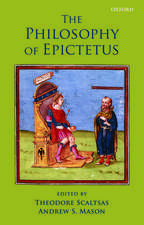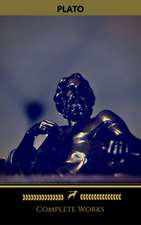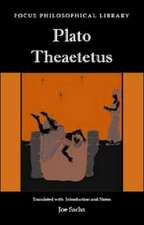Parmenides
Autor Plato Traducere de Benjamin Jowetten Limba Engleză Paperback – 11 oct 2018
| Toate formatele și edițiile | Preț | Express |
|---|---|---|
| Paperback (22) | 45.18 lei 3-5 săpt. | |
| CREATESPACE – | 45.18 lei 3-5 săpt. | |
| CREATESPACE – | 47.00 lei 3-5 săpt. | |
| CREATESPACE – | 47.86 lei 3-5 săpt. | |
| CreateSpace Independent Publishing Platform – | 48.89 lei 3-5 săpt. | |
| – | 71.13 lei 3-5 săpt. | |
| CREATESPACE – | 71.19 lei 3-5 săpt. | |
| CreateSpace Independent Publishing Platform – | 75.38 lei 3-5 săpt. | |
| Focus Publishing – 31 dec 1995 | 85.24 lei 3-5 săpt. | +13.17 lei 6-10 zile |
| CREATESPACE – | 85.65 lei 3-5 săpt. | |
| – | 91.47 lei 3-5 săpt. | |
| Hackett Publishing Company – 15 iun 1996 | 112.27 lei 3-5 săpt. | |
| – | 50.80 lei 6-8 săpt. | |
| Watchmaker Publishing – 24 iul 2011 | 55.16 lei 6-8 săpt. | |
| ARC MANOR – 28 aug 2008 | 62.54 lei 6-8 săpt. | |
| Lector House – 10 iun 2019 | 65.19 lei 6-8 săpt. | |
| Echo Library – 30 sep 2006 | 68.61 lei 38-44 zile | |
| BLURB INC – 22 feb 2019 | 83.46 lei 17-23 zile | |
| Book Jungle – 17 apr 2008 | 91.00 lei 6-8 săpt. | |
| Akasha Classics – 11 noi 2009 | 91.06 lei 6-8 săpt. | |
| Alpha Editions – 26 mai 2023 | 91.44 lei 6-8 săpt. | |
| 1st World Publishing – 30 sep 2008 | 103.19 lei 6-8 săpt. | |
| TREDITION CLASSICS – 31 oct 2011 | 145.30 lei 6-8 săpt. | |
| Hardback (3) | 134.17 lei 6-8 săpt. | |
| Binker North – mar 1912 | 134.17 lei 6-8 săpt. | |
| 1st World Publishing – 30 sep 2008 | 150.12 lei 6-8 săpt. | |
| Akasha Classics – 11 noi 2009 | 173.37 lei 6-8 săpt. |
Preț: 40.48 lei
Nou
Puncte Express: 61
Preț estimativ în valută:
7.75€ • 7.99$ • 6.46£
7.75€ • 7.99$ • 6.46£
Carte indisponibilă temporar
Doresc să fiu notificat când acest titlu va fi disponibil:
Se trimite...
Preluare comenzi: 021 569.72.76
Specificații
ISBN-13: 9781728719252
ISBN-10: 1728719259
Pagini: 94
Dimensiuni: 127 x 203 x 6 mm
Greutate: 0.11 kg
Editura: LIGHTNING SOURCE INC
ISBN-10: 1728719259
Pagini: 94
Dimensiuni: 127 x 203 x 6 mm
Greutate: 0.11 kg
Editura: LIGHTNING SOURCE INC
Recenzii
Keith
Whitaker's
insightful
introduction
to
this
notoriously
daunting
text
is
valuable
for
its
clarity
and
sobriety.
The
lucid
interpretation
will
be
of
interest
to
those
versed
in
the
text
and
will
be
of
great
help
to
any
who
encounter
the
dialogue
for
the
first
time.
The
engaging
translation
humanizes
the
discourse
without
compromising
its
precision
-
a
notable
achievement
that
will
earn
the
gratitude
of
readers.
--Joseph
Cropsey,
University
of
Chicago
Notă biografică
Plato was an ancient Greek philosopher born in Athens during the Classical period in Ancient Greece. In Athens, Plato founded the Academy, a philosophical school where he taught the philosophical doctrines that would later become known as Platonism. Plato (or Platon) was a pen name derived, apparently, from the nickname given to him by his wrestling coach - allegedly a reference to his physical broadness. According to Alexander of Miletus quoted by Diogenes of Sinope his actual name was Aristocles, son of Ariston, of the deme Collytus (Collytus being a district of Athens).Plato was an innovator of the written dialogue and dialectic forms in philosophy. He raised problems for what later became all the major areas of both theoretical philosophy and practical philosophy. His most famous contribution is the Theory of forms, which has been interpreted as advancing a solution to what is now known as the problem of universals. He is also the namesake of Platonic love and the Platonic solids.His own most decisive philosophical influences are usually thought to have been, along with Socrates, the pre-Socratics Pythagoras, Heraclitus, and Parmenides, although few of his predecessors' works remain extant and much of what we know about these figures today derives from Plato himself.[a]Along with his teacher, Socrates, and his student, Aristotle, Plato is a central figure in the history of philosophy.[b] Unlike the work of nearly all of his contemporaries, Plato's entire body of work is believed to have survived intact for over 2,400 years.[6] Although their popularity has fluctuated, Plato's works have consistently been read and studied. Through Neoplatonism Plato also greatly influenced both Christian and Islamic philosophy (through e.g. Al-Farabi). In modern times, Alfred North Whitehead famously said: "the safest general characterization of the European philosophical tradition is that it consists of a series of footnotes to Plato.















